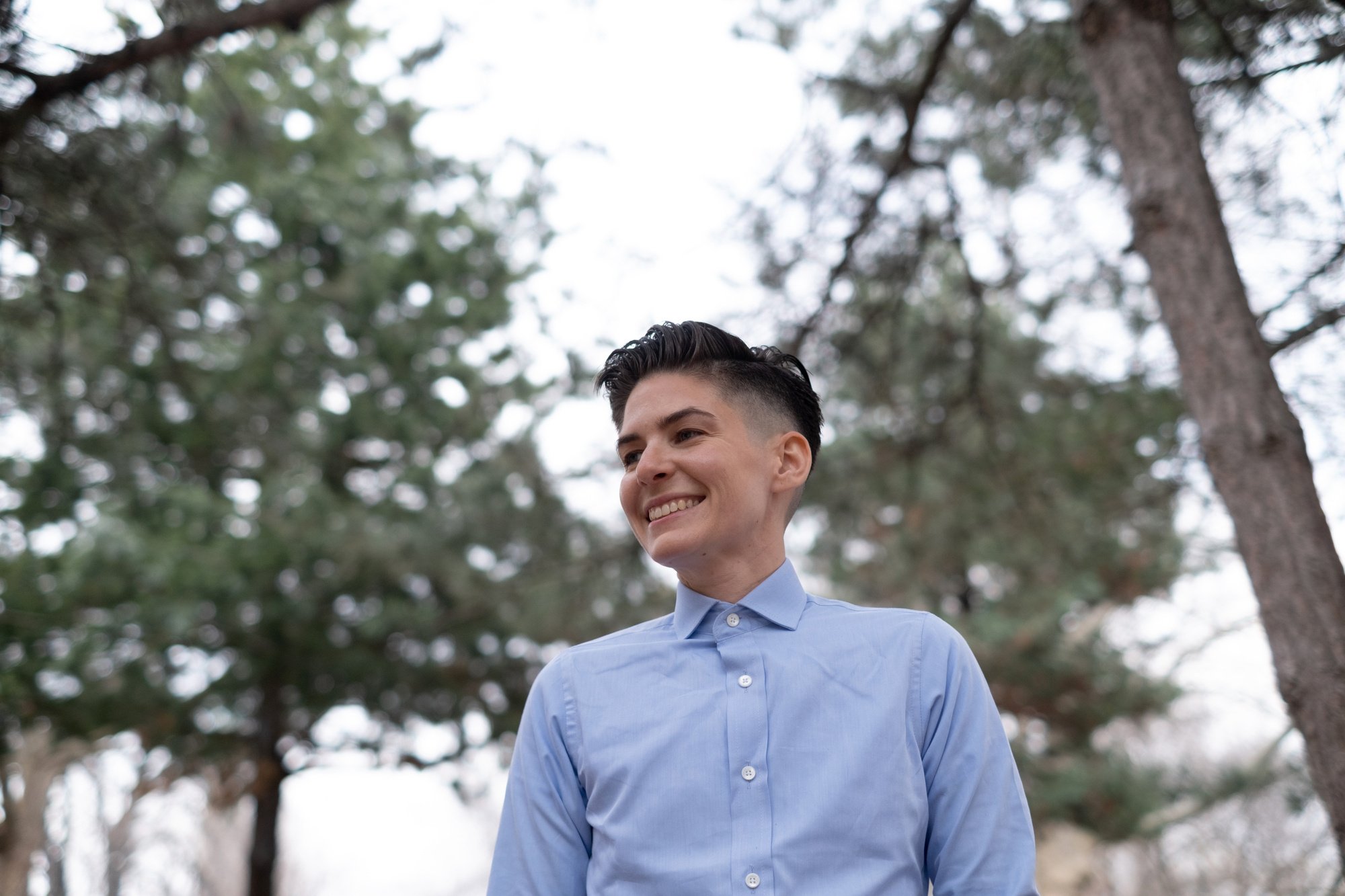The power of words: Nate Shalev on inclusive language at work
Mar 07, 2023
8 mins

Creating an inclusive and equitable work culture has become a priority for a growing number of companies in recent years, and transforming the way we speak to each other is an inevitable part of that effort. Communication is the glue that holds any organization together, and only by using language that embraces our differences, and speaks to our values, can we nurture a professional culture in which everyone can show up to work as their authentic self.
To learn more about how to champion inclusive language at the office, we sat down with Nate Shalev, founder of social impact and DEI consultancy Revel Impact. Since 2021, Shalev have worked with world-renowned companies across the board, including startups, nonprofits, and foundations, and have also led workshops and keynotes on building foundations of inclusive language in the workplace.
To start with, any initial thoughts to share on the topic of inclusive language in the workplace?
Inclusive language is part of a drive to create inclusive work environments more broadly. I think it’s based on an increased understanding of the fact that we should be able to be who we are at work. In work environments that are intentionally thinking about how to support us, we’re able to work better. When we work better, our businesses will be better; we’ll also be more innovative and better at collaborating and we’ll simply be able to show up in a way that’s more full and vibrant and valuable to one another.
Furthermore, language shapes how we understand ourselves and how we perceive the world around us. When we’re thinking about inclusive language, we’re simply paying attention to the way people feel: What do they want to be called, how do they want to be referred to and what words will make them feel great and like their best selves? But it’s also thinking about how we’re taking the systemic and historical discrimination out of our language.
Do you see strides being made in this area in recent years?
I see a lot more awareness around inclusive language these days. I talk a lot about trans and LGBTQ+ identities and many folks come to me already knowing that the language in that space is important. They want to talk about it, but they’re not sure how or they’re afraid to get it wrong. But when they come to me, it’s with the understanding that this is important and they want to learn. There’s much more of a willingness there.
This reminds me of a recent experience I had. I was at a conference talking about the considerations I took in as a trans person there, and I mentioned a lack of gender-inclusive restrooms. The next day, one of the bathrooms had been changed to be gender inclusive…I don’t think that that would’ve happened years ago. Many of the conference attendees stopped me to ensure I knew it was there, as I’d spoken about how hard it can be to navigate a conference searching for a restroom as a trans person.
As such, inclusive language is definitely on peoples’ minds, and there’s an openness to the topic today. I think when folks are able to embrace it—even when they’re uncertain—they’re not afraid to ask what it is about the inclusive language that’s making them uncomfortable. They’re not afraid to interrogate those parts of themselves. In the end, we’re really able to get somewhere when people understand that the effort is about making us all strive and flourish—and it’s not taking anything away from somebody else.
Is it usually older employees who end up being resistant to DEI changes? Or is that a stereotypical outlook?
It’s not necessarily about somebody’s age. There are folks across the board who can be more or less resistant. But I think there might be something to be said for seniority within an organization; folks who have been around longer tend to be a little bit more resistant to change, maybe because they’ve seen change try to happen and it didn’t go well. So, sometimes they might have some baggage around that. But I don’t necessarily think it’s only older employees who are resistant.
Of course, there’s a way to talk about generational differences, which I think is always a really fruitful conversation to have. For instance, thinking about the word “queer,” which is so embedded into our language now that it’s used as an umbrella term for LGBTQ+ identities. Older generations sometimes dismiss that word, maybe partly because it used to be a slur.
What can offices or workplaces do to incorporate more inclusive language at work? Is it up to Human Resources departments or DEI teams to lead the charge?
The first thing is to take this discussion out of a specific function; it’s not just within HR or the DEI team. Rather, it’s about talking about it frequently and often and everywhere and always, and making sure that there’s a framework for a discussion about inclusive language… why we’re using it, how you can use it, and what to do if somebody gets it wrong.
I often have companies come to me after, say, they tried to roll out pronouns. Maybe they asked everyone to put their pronouns in their email signatures, and they faced pushback because people didn’t know what it was or felt like their own needs weren’t prioritized. They might be thinking, “Why am I putting my pronouns and my signature? Why are we talking about gender and not the issues I want to address?” Whatever the need they feel isn’t being prioritized may be—like parental leave—is what will be on their minds if they’re made to partake in an initiative they don’t understand.
Ultimately, a company needs to create that framework around how to have these conversations, talking about the “why,” and then ensuring there are avenues to give voice to the multiple communities that exist within the organization. That could be through focus groups or employee resource groups [Editor’s note: Shalev runs monthly Inclusion Roundtables], but there’s never going to be just one thing that works for everyone. I’m thinking about disabled communities; many disabled folks prefer identity-first language versus person-first, meaning “I am autistic” versus “I’m a person with autism,” but for other identities, they prefer person-first versus the identity-first. It’s necessary to hear from everyone across communities and to remember that even folks within the same identity group might feel different ways about words and phrasing.
**Do you think that more companies are actually making efforts to hold these kinds of focus groups? And how can you measure a company’s accountability?
I think that more companies are understanding how important it is to be intentional about inclusivity. I think you’re able to measure accountability in a few tangible ways. If people aren’t feeling included, then you’re going to have higher turnover rates; you’re going to have people leaving; you’re going to be able to see who’s getting promoted, who’s not getting promoted. It’s very much resulting from whether a place feels inclusive or not. What’s more, I would say that the most innovative companies are going to be inclusive because they’re going to be the top brands that folks want to work for—and that’s where the top talent will end up.
How would you solve a situation in which two employees are engaged in some sort of conflict about inclusive language at work?
First, the company needs to make sure their values are clear to everyone, that they’re part of a workplace that values identity, that they want everyone to be able to show up as who they are, that there are principles around how people are supposed to operate and behave. So, you can always lean on that when there’s any sort of conflict.
On the other hand, you can’t have a conflict over someone’s experience or identity— that’s not actually a conflict. If somebody is telling you certain language is harmful, or that this is their identity and this is how they want to be referred to, you have to believe them even if you don’t understand them. You can’t debate somebody’s identity. So, what should come first is understanding what the actual nature of the conflict is. If it’s somebody not using my right pronouns, then they’re not respecting me as an employee or seeing me as a person, and now this workplace is no longer a safe place for me.
I guess it all boils down to, like you said, the company being outspoken about its values…
In the end, it’s often much simpler than people think. If somebody is resistant to pronouns, for instance, it could just be a matter of them being afraid to say the wrong thing—or, it could be a matter of somebody actually just not respecting this person. And those are two very different conversations to have. One can be language-based and then one has to be accountability-based.
What sparked the idea for Revel Impact?
Before creating Revel Impact, I spent over a decade in the social impact and nonprofit space where I found that even organizations that were dedicated to doing good in the world could still be unhealthy places to work. Essentially, they weren’t making the impact they claimed. I was having terrible experiences. Seeing that there was a real need to create better workplaces, where both business and people can thrive, is what sparked me creating the company.
Right now, Revel operates primarily through working directly with teams. A team might come to me to be proactive, so they have either just started their inclusion journeys at work and they want to make sure that their foundation is strong. Or sometimes there’s a particular intent, like a team wants to help support its neurodivergent employees, or they want specific education around LGBTQ+ and trans-inclusion, for instance.
Other times, I work with companies in reaction mode. Something has happened—like they tried to roll out pronouns and got pushback. So now, I’m going to come in to help them with education, policy or restructuring.
The way it works is, we go in to do the education… speaking to teams, holding workshops, and do strategic advising to help guide initiatives. We create the resources that folks need, helping to advise on policy or language. I get asked a lot about language—helping people develop inclusive language for whatever it may be, like their job descriptions or their mission statements.
I should say that I’m not convincing anyone that these initiatives are important. Everyone who’s coming to me knows it’s important and they’re looking to start the work or to do it better.
You share a lot about your personal experiences on platforms like LinkedIn. Do you think doing that helps clients connect with you?
I absolutely do think sharing personal experiences helps to build empathy. It helps to create posts so folks are able to read my story and know that I’m a real person. If I just posted something that said “Be better to your trans employees,” that’s not going to mean anything to anybody. Instead, I’ll talk about a specific instance, like when there was a systemic problem while I was applying to a job and had to navigate an application process that had a legal name versus chosen name field. There was so much stress to fill out the right name— on top of the normal stress of filling out a job application. When I share these personal anecdotes, it might make people think about when they’ve experienced something similar, and then draw their own conclusions or at least see the framework that I’m talking about.
What can individuals do to make their own language more inclusive?
If folks are interested in making sure that their language is as inclusive as possible, they can seek out the resources on their own. They can consume as many narratives as they want, listen to podcasts of folks of different identities, read memoirs, watch documentaries…
Personally, when I speak out on this, I’m only one autistic person; I’m only one trans person. So, my experience is specific to me. I grew up in New York. I’m white. I’m Jewish. It’s all filtered through my very unique context and the way that I understand things. So, in order to really ensure our language is as inclusive as it can be, we have to understand how the intersection of all our identities informs this. The only way to do that is to learn more about it—to go out on our own. Because what it all comes down to is a will to value people and respect the way they wish to be seen and treated.
Photo: Bess Adler for Welcome to the Jungle
Follow Welcome to the Jungle on Facebook on LinkedIn and on Instagram and subscribe to our newsletter to get our latest articles every day!

More inspiration: DEI

Sh*t’s broken—Here’s how we fix work for good
Built by and for a narrow few, our workplace systems are in need of a revolution.
Dec 23, 2024

What Kamala Harris’s legacy means for the future of female leadership
The US presidential elections may not have yielded triumph, but can we still count a victory for women in leadership?
Nov 06, 2024

Leadership skills: Showing confidence at work without being labeled as arrogant
While confidence is crucial, women are frequently criticized for it, often being labeled as arrogant when they display assertiveness.
Oct 22, 2024

Pathways to success: Career resources for Indigenous job hunters
Your culture is your strength! Learn how to leverage your identity to stand out in the job market, while also building a career
Oct 14, 2024

Age does matter, at work and in the White House
What we've learned from the 2024 presidential elections about aging at work.
Sep 09, 2024
The newsletter that does the job
Want to keep up with the latest articles? Twice a week you can receive stories, jobs, and tips in your inbox.

Looking for your next job?
Over 200,000 people have found a job with Welcome to the Jungle.
Explore jobs



